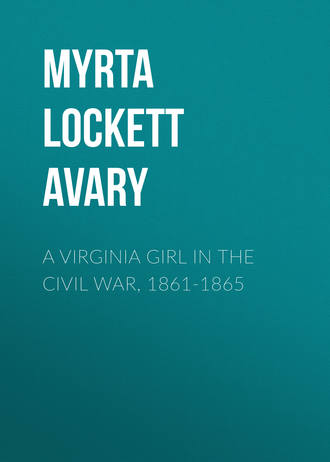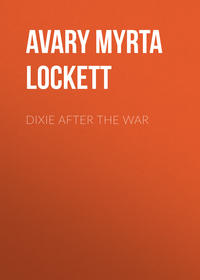 полная версия
полная версияA Virginia Girl in the Civil War, 1861-1865
I thrust my head out of the window.
“Walter!” I called.
He looked up.
“Hello, Nell!” he cried, waving his hat around his head and galloping on.
He was on his way to his bride from whom he had parted at the altar.
But even at this supreme moment of their lives he and Betty were good enough to remember me, and in a few hours after I hailed him from the window Walter called.
“Where is Dan?” was my first question.
“I don’t know, Nell,” he answered. “But I know he’s alive and well and will be along in a few days.”
That was all the comfort I got from any friends returning from the field.
A little later there was a grand review of Federal troops in Richmond, and I remember how well-clad and sleek they were and how new and glittering were their arms. Good boots, good hats, a whole suit of clothes to every man – a long, bright, prosperous-looking procession. On the sidewalk a poor Confederate in rags and bootless, stood looking wistfully on.
The next day I heard that General Rooney Lee had arrived, and I went to see him. I was shown up to his mother’s room, and she told me that he had not come, but was hourly expected. When I called the next day I met him and Miss Mildred Lee in the door. They were going out, but the general stepped back with me into the hall.
“I came to see if you could tell me anything about Dan, general.”
“Mrs. Grey,” he said, “you know Dan as well as I do. He isn’t whipped yet. I told him it was all foolishness, and that the war was over, but he wouldn’t surrender with me, and is going through to Johnston’s army. But he will have to come back, and he will be here soon, I think. Johnston’s army has surrendered.”
“You think then that nothing has happened to him, general?”
“Oh, no. I am sure of that.”
General Lee dropped his voice.
“Mrs. Grey, it may be several days before Dan gets in. In the meanwhile let me supply your wants as best I can. You should not mind applying to me or accepting assistance from me.”
“I appreciate your kindness more than I can tell you, general, but I don’t really need anything.”
“If you should stand in need of money or assistance of any kind before Dan gets in, let me know, won’t you?”
“Indeed I will, dear general.”
We all three walked down Franklin Street together until Miss Mildred, who was going to see some friends on Grace Street, had to turn. After the two had just turned the corner I heard the general say:
“Wait for a minute, Mildred.”
He slipped back, put his hand in his pocket, and took out a thin roll of bills, a very thin roll.
“Mrs. Grey,” he said, “here is all the money I have in the world, ten dollars in greenbacks. Take half of it – I wish you would – it wouldn’t inconvenience me at all. I will make some more soon, and then I will divide with you again until Dan comes home.”
I could hardly speak for tears. At that moment I was richer than my general. I had at home in gold and greenbacks more money than General Lee.
“God bless you, general!” I managed to say. “But really I don’t need it. If I do really and truly I will come to you for it.”
Franklin Street wasn’t a good place to cry in, so I hurried home.
Still the days that passed did not bring me Dan. I became thoroughly miserable. I sat in my window and watched and was cross if anybody spoke to me.
One day a servant brought up a message:
“Er gent’man in de parlor to see yer, missy.”
“What sort of a ‘gent’man’ is it?” I asked tartly. There was but one man in the world I wanted to see or hear about just then.
“He ain’t lak our people, missy. He’s furrin – French or suppin nuther. He say how he usen ter know yer in Petersburg. An’ how you lent ’im some – er – music – er suppin lak dat. An’ he got – er – errah – suppin – I clar fo’ de Lord, missy, I dunno what ’tis – but he got suppin – ”
“Oh, I know,” I said. “He’s that old French music-teacher, and he’s brought back that old music I lent him in the year one. Go tell him that I don’t want it; he can have it.”
Jake departed only to return in a more perplexed frame of mind and state of speech.
“He say how ’tain’t no music he’s got fur yer. He say – he do say, missy – but de Lord knows I dunno what he say! – but anyway be bleeged to see yer.”
I got up and went down to the parlor in desperation.
Sure enough, it was the little French music-teacher, and he began apologies, acknowledgments and what not in his dreadful English.
“Madame, I haf no mooseek to you – not at all. I haf one message of you to ze majaire. If you not b’lief me,” he fumbled in his pocket and brought out a dirty bit of paper, “look at ze cart – vat sail I call him? ze lettaire. If madame vill look – I beg ze pardon of madame – ”
I snatched the paper out of his hand. And then – I couldn’t make it out. Written in the first place with an indifferent pencil on a worn bit of the poor paper of that day and carried in the little Frenchman’s very ragged and grimy pocket, the scrawl was illegible. It had never been more than a line of some five or six words. While I was trying to make it out the little Frenchman explained that it was merely a line introducing himself as the bearer of a message.
What that message was I never did hear, though the little Frenchman did his best to deliver and I to receive it. I got enough out of him, however, to know that Dan was well and on his way to Richmond. I also understood that he was not far from Richmond now, but what was detaining him I could not make out, though the little Frenchman, with many apologies, conveyed the hint to me that it was a delicate matter. After he was gone I wondered why I was so stupid as not to get the little man’s address so that I could send some friends who understood French after him. From what he had said I had inferred that my husband would be with me the following day. I watched in a fever of impatience, but two days passed and no Dan.
The third night as I laid my aching head on the pillow I said: “Mother, if he don’t come to-morrow, the next day I start out to look for him.”
Do you know how it is to feel in your sleep that some one is looking at you? This is the sort of sensation that aroused me the next morning, and I opened my eyes in the early dawn to find my husband standing by the bed with clasped hands looking down at me.
Ah, we were happy – we were happy! Ragged, defeated, broken, we but had each other and that was enough.
But there is a ludicrous side that I must tell you. I must explain how Dan was dressed. He wore a pair of threadbare gray trousers patched with blue; they were much too short for him, and there were holes which were not patched at all; he had no socks on, but wore a ragged shoe of one size on one foot, and on the other a boot of another size and ragged too; he had on a blue jacket much too small for him – it was conspicuously too short, and there was a wide margin between where it ended and his trousers began, and he had on a calico shirt that looked like pink peppermint candy. Set back on his head was an old hat, shot nearly all to pieces – you could look through the holes, and it had tags hanging around where the brim had been. He was a perfect old ragman except for the very new pink shirt.
“My dear Dan,” I said, “what a perfect fright you are! What a dreadful ragtag and bobtail!”
“Why, Nell,” he said, “I thought these very good clothes. What’s missing, my dear? My suit is very complete; whole trousers, jacket, new shirt, hat on my head, even down to something on both feet. Last week I didn’t have any shirt, nor any jacket to speak of, and my trousers weren’t patched and I didn’t have anything on my feet. One reason I took so long to get here was because I was trying to get a few clothes together – I wasn’t dressed to my taste, you see. It took much time and labor to collect all this wearing apparel. I got first one piece and then another, until I am as you see me, fit to enter Richmond. Somebody stole my trousers one morning – I was in an awful plight. That was the time the little Frenchman passed and I sent you a message. Did he tell you that I’d get home as soon as I got another pair of trousers if somebody didn’t steal my jacket by that time?”
I was laughing and crying all the time he was talking. When I pulled off boot and shoe I found that he had spoken the truth in jest when he said he had been walking barefoot nearly all the way. His feet were sore. I had some good shoes for him, and I got out an old civilian suit that he had worn before the war. It didn’t fit him now and looked antiquated, but he donned it with great satisfaction.
Then we went out shopping. It was shopping in a city of ruins. As we walked along the streets there were smoking pits on each side of us. Here and there the remnants of what had been a store enabled us to purchase shoes at one place and the materials for two white shirts at another, and to our great joy we found a hat for which he paid two dollars, United States money.
We had nothing on which to begin life over again, but we were young and strong, and began it cheerily enough. We are prosperous now, our heads are nearly white; little grandchildren cluster about us and listen with interest to grandpapa’s and grandmamma’s tales of the days when they “fought and bled and died together.” They can’t understand how such nice people as the Yankees and ourselves ever could have fought each other. “It doesn’t seem reasonable,” says Nellie the third, who is engaged to a gentleman from Boston, where we sent her to cultivate her musical talents, but where she applied herself to other matters, “it doesn’t seem reasonable, grandmamma, when you could just as easily have settled it all comfortably without any fighting. How glad I am I wasn’t living then! How thankful I am that ‘Old Glory’ floats alike over North and South, now!”
And so am I, my darling, so am I!
But for us – for Dan and me – we could almost as easily give up each other as those terrible, beloved days. They are the very fiber of us.
THE END

